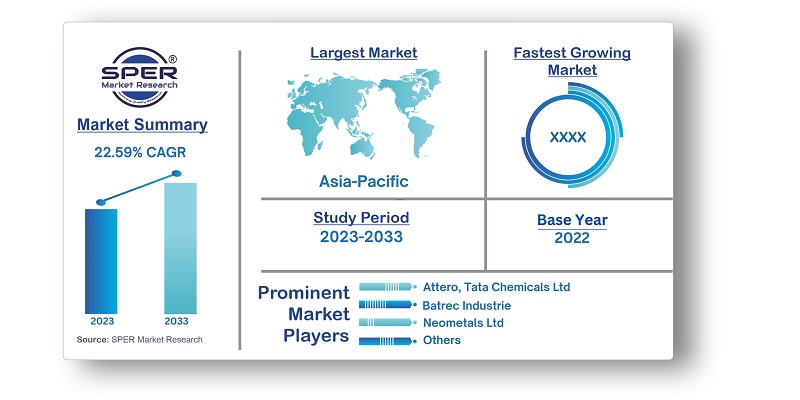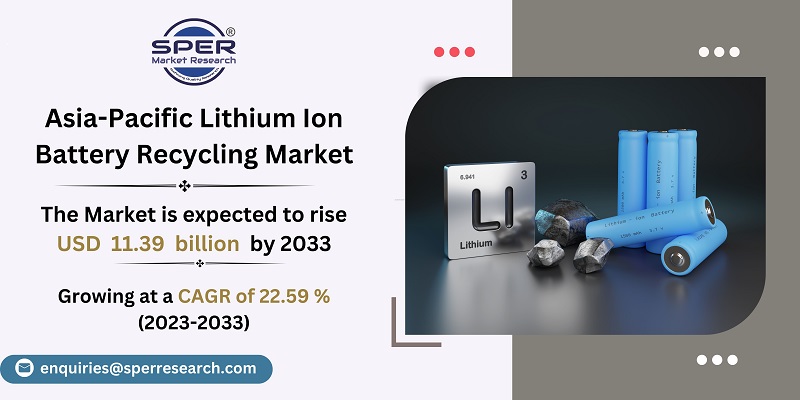
Asia Pacific Lithium Ion Battery Recycling Market Growth, Size, Trends, Revenue and Future Outlook
Asia Pacific Lithium Ion Battery Recycling Market Size– By Component, By Chemistry, By Recycling Process- Regional Outlook, Competitive Strategies and Segment Forecast to 2033
| Published: Jan-2024 | Report ID: POAE2410 | Pages: 1 - 155 | Formats*: |
| Category : Power & Energy | |||
- May 2020: Neometals Ltd. and the Indian power trading company Manikaran Power Limited (MPL) partnered to conduct an AACE Class 3 Feasibility Study, which was jointly financed and aimed to assess an Indian lithium refinery. Following the findings of the study, Neometals intends to invest in a 50:50 joint venture with MPL to develop the lithium refinery. This will facilitate the company's entry into the Indian market.
- March 2021: Envirostream Australia Pty Ltd obtained consent from the city council in to develop a larger recycling plant for used or garbage batteries in Melbourne, Victoria. This is their second location. This will assist the company in achieving its objective of recycling batteries throughout Australia and preventing them from ending up in landfills.


| Report Metric | Details |
| Market size available for years | 2019-2033 |
| Base year considered | 2022 |
| Forecast period | 2023-2033 |
| Segments covered | By Component , By Chemistry, By Recycling Process |
| Regions covered | China, Japan, India, South Korea, Singapore, Malaysia, Australia, Thailand, Indonesia, Philippines, and Rest of Asia-Pacific (APAC) |
| Companies Covered | Glencore, Retriev Technologies, Contemporary Amperex Technology Co. Ltd., Ganfeng Lithium Co. Ltd., Attero, Tata Chemicals Ltd., Batrec Industrie, Neometals Ltd., Envirostream Australia Pty Ltd. and various others. |
- Battery Manufacturers.
- Recycling Companies
- Government Agencies and Regulators
- Environmental Organizations
- Electric Vehicle (EV) Manufacturers
- Research and Development (R&D) Institutions
- Supply Chain and Logistics Companies
- Consumers and General Public
- Investors and Financial Institutions
| By Component: |
|
| By Chemistry: |
|
| By Recycling Process: |
|
- Asia-Pacific Lithium Ion Battery Recycling Market Size (FY’2023-FY’2033)
- Overview of Asia-Pacific Lithium Ion Battery Recycling Market
- Segmentation of Asia-Pacific Lithium Ion Battery Recycling Market By Component (Active Material, Non-Active Material)
- Segmentation of Asia-Pacific Lithium Ion Battery Recycling Market By Chemistry (Lithium-Nickel Manganese Cobalt , Lithium Cobalt Oxide , Lithium-Manganese Oxide, Lithium-Iron Phosphate, Lithium-Nickel Cobalt Aluminium Oxide, Lithium-Titanate Oxide
- Segmentation of Asia-Pacific Lithium Ion Battery Recycling Market By Recycling Process (Hydrometallurgical Process, Pyro metallurgy Process, Physical/ Mechanical Process)
- Statistical Snap of Asia-Pacific Lithium Ion Battery Recycling Market
- Expansion Analysis of Asia-Pacific Lithium Ion Battery Recycling Market
- Problems and Obstacles in Asia-Pacific Lithium Ion Battery Recycling Market
- Competitive Landscape in the Asia-Pacific Lithium Ion Battery Recycling Market
- Impact of COVID-19 and Demonetization on Asia-Pacific Lithium Ion Battery Recycling Market
- Details on Current Investment in Asia-Pacific Lithium Ion Battery Recycling Market
- Competitive Analysis of Asia-Pacific Lithium Ion Battery Recycling Market
- Prominent Players in the Asia-Pacific Lithium Ion Battery Recycling Market
- SWOT Analysis of Asia-Pacific Lithium Ion Battery Recycling Market
1.1. Scope of the report1.2. Market segment analysis
2.1. Research data source2.1.1. Secondary Data2.1.2. Primary Data2.1.3. SPER’s internal database2.1.4. Premium insight from KOL’s2.2. Market size estimation2.2.1. Top-down and Bottom-up approach2.3. Data triangulation
4.1. Driver, Restraint, Opportunity and Challenges analysis4.1.1. Drivers4.1.2. Restraints4.1.3. Opportunities4.1.4. Challenges4.2. COVID-19 Impacts of the Asia-Pacific Lithium ion battery Recycling Market
5.1. SWOT Analysis5.1.1. Strengths5.1.2. Weaknesses5.1.3. Opportunities5.1.4. Threats5.2. PESTEL Analysis5.2.1. Political Landscape5.2.2. Economic Landscape5.2.3. Social Landscape5.2.4. Technological Landscape5.2.5. Environmental Landscape5.2.6. Legal Landscape5.3. PORTER’s Five Forces5.3.1. Bargaining power of suppliers5.3.2. Bargaining power of buyers5.3.3. Threat of Substitute5.3.4. Threat of new entrant5.3.5. Competitive rivalry5.4. Heat Map Analysis
6.1. Asia-Pacific Lithium ion battery Recycling Market Manufacturing Base Distribution, Sales Area, Product Type6.2. Mergers & Acquisitions, Partnerships, Product Launch, and Collaboration in Asia-Pacific Lithium ion battery Recycling Market
7.1. Asia-Pacific Lithium ion battery Recycling Market Value Share and Forecast, By Component, 2023-20337.2. Active Material7.3. Non-Active Material
8.1. Asia-Pacific Lithium ion battery Recycling Market Value Share and Forecast, By Chemistry, 2023-20338.2. Lithium Cobalt Oxide8.3. Lithium-Iron Phosphate8.4. Lithium-Manganese Oxide8.5. Lithium-Nickel Cobalt Aluminium Oxide8.6. Lithium-Nickel Manganese Cobalt
8.7. Lithium-Titanate Oxide
9.1. Asia-Pacific Lithium ion battery Recycling Market Value Share and Forecast, By Recycling Process, 2023-20339.2. Hydrometallurgical Process9.3. Physical/ Mechanical Process9.4. Pyro metallurgy Process
10.1. Asia-Pacific Lithium ion battery Recycling Market Size and Market Share
11.1. Asia-Pacific Lithium ion battery Recycling Market Size and Market Share By Component (2019-2026)11.2. Asia-Pacific Lithium ion battery Recycling Market Size and Market Share By Component (2027-2033)
12.1. Asia-Pacific Lithium ion battery Recycling Market Size and Market Share By Chemistry (2019-2026)12.2. Asia-Pacific Lithium ion battery Recycling Market Size and Market Share By Chemistry (2027-2033)
13.1. Asia-Pacific Lithium ion battery Recycling Market Size and Market Share By Recycling Process (2019-2026)13.2. Asia-Pacific Lithium ion battery Recycling Market Size and Market Share By Recycling Process (2027-2033)
14.1. Asia-Pacific Lithium ion battery Recycling Market Size and Market Share By Region (2019-2026)14.2. Asia-Pacific Lithium ion battery Recycling Market Size and Market Share By Region (2027-2033)14.2.1. Australia14.2.2. China14.2.3. India14.2.4. Indonesia14.2.5. Japan14.2.6. Malaysia14.2.7. Philippines14.2.8. Singapore14.2.9. South Korea14.2.10. Thailand14.2.11. Rest of Asia-Pacific (APAC)
15.1. Attero15.1.1. Company details15.1.2. Financial outlook15.1.3. Product summary15.1.4. Recent developments15.2. Batrec Industrie15.2.1. Company details15.2.2. Financial outlook15.2.3. Product summary15.2.4. Recent developments15.3. Contemporary Amperex Technology Co.15.3.1. Company details15.3.2. Financial outlook15.3.3. Product summary15.3.4. Recent developments15.4. Envirostream Australia Pty Ltd.15.4.1. Company details15.4.2. Financial outlook15.4.3. Product summary15.4.4. Recent developments15.5. Ganfeng Lithium Co. Ltd.15.5.1. Company details15.5.2. Financial outlook15.5.3. Product summary15.5.4. Recent developments15.6. Glencore15.6.1. Company details15.6.2. Financial outlook15.6.3. Product summary15.6.4. Recent developments15.7. Neometals Ltd.15.7.1. Company details15.7.2. Financial outlook15.7.3. Product summary15.7.4. Recent developments15.8. Retriev Technologies15.8.1. Company details15.8.2. Financial outlook15.8.3. Product summary15.8.4. Recent developments
15.20 Others
SPER Market Research’s methodology uses great emphasis on primary research to ensure that the market intelligence insights are up to date, reliable and accurate. Primary interviews are done with players involved in each phase of a supply chain to analyze the market forecasting. The secondary research method is used to help you fully understand how the future markets and the spending patterns look likes.
The report is based on in-depth qualitative and quantitative analysis of the Product Market. The quantitative analysis involves the application of various projection and sampling techniques. The qualitative analysis involves primary interviews, surveys, and vendor briefings. The data gathered as a result of these processes are validated through experts opinion. Our research methodology entails an ideal mixture of primary and secondary initiatives.



Frequently Asked Questions About This Report
PLACE AN ORDER
Year End Discount
Sample Report
Pre-Purchase Inquiry
NEED CUSTOMIZATION?
Request CustomizationCALL OR EMAIL US
100% Secure Payment






Related Reports
Our Global Clients
Our data-driven insights have influenced the strategy of 200+ reputed companies across the globe.




















